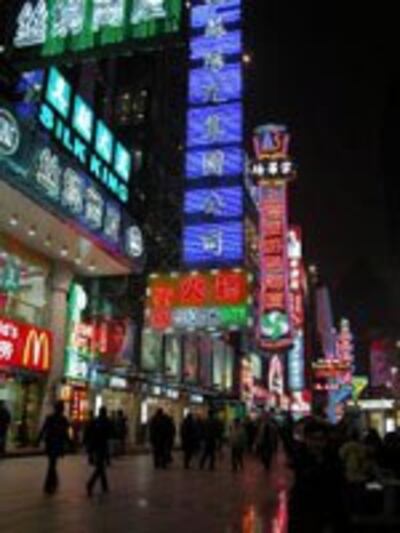
China's economic growth has far exceeded last year's official targets, raising doubts about whether cooling measures have worked. Economists told RFA that Beijing needs to consider higher interest rates and move towards revaluing the currency.
China's GDP grew by 9.5 percent in the fourth quarter of 2004, boosting GDP growth for the entire year to the same level, far higher than government targets of around 7 percent set by Premier Wen Jiabao at the National People's Congress (NPC) in March.
"As far as whether the measures were effective, you have to recognize the fact that the central government in China does not have the kind of sophisticated monetary and fiscal policy controls that you would have in a fully developed capitalist economy," economist Dale Jorgenson told RFA's Wu dialect service.

"They've been developing very rapidly, and it's very impressive, but it's still basically a developing country and an emerging growth country," he said.
Top regulators spent much of last year trying to rein in China's runaway growth, blamed for rising prices and shortages of power, rail capacity, and fuel. China's double-digit growth in demand has also driven up prices of commodities such as crude oil and steel around the world.
Controls not working
Wen's lower target of "around 7 percent" was adopted by the State Development and Reform Commission as a priority task and was repeated by People's Bank of China Governor Zhou Xiaochuan in an April 24 speech to the International Monetary Fund in Washington.
The government has relied heavily on administrative attempts to control the economy, but very little on traditional macro-economic levers currently used in developed economies, experts told RFA.
"The controls have not worked so far, and you really wouldn't expect them to work, given the nature of the controls and the nature of the situation," Barry Naughton, professor of Chinese economics at the University of California told RFA reporter Michael Lelyveld.
"If people think that a real estate investment is going to be profitable, restricting the supply of land to real estate isn't going to slow down investment in real estate. It's simply going to mean that people will invest more rapidly in the land that they have available, and that land will go up in value," Naughton said.
Currency under pressure
"The dirty secret of planned economies was they were never really controllable in that way. And if China's economy wasn't controllable through that kind of command-and-control system in the early 1980s, when it was only one-eighth the size of what it is now, it certainly isn't controllable that way now," he said.
Gary Jefferson, professor and chair of the economics department at Brandeis University, said China's peg to the U.S. dollar, which it has come under increasing pressure from trading partners to revalue, may also have contributed to runaway economic growth.
Since the Chinese yuan is pegged to the dollar, its value fell along with it, making Chinese goods cheaper on other markets abroad, Jefferson said.
"The fall of the dollar has taken with it the Chinese yuan, which has been depreciating and thereby making Chinese exports all the more competitive, and so my expectation is that net exports, the excess of exports over imports, has been growing during the year and has quite possibly accelerated during the fourth quarter."
"If these high rates of growth translate into accelerating inflation, then clearly a revaluation of the Chinese currency will be an increasingly important policy instrument, and it will also be increasingly difficult to rely exclusively on other macroeconomic instruments in order to maintain GDP targets and price stability," he said.
China overshot its inflation target of 3 percent in 2004; consumer prices rose by 3.9 percent for the whole of 2004, compared with a rise of just 1.2 percent in the previous year.
Political obstacles
Growth in fixed asset investments reached 25.8 percent in spite of a government crackdown on bank loans and land use for new projects in overheated sectors like steel.
Naughton said the Beijing political climate made use of macroeconomic controls such as interest rates more problematic.
"I think there's intense debate about this in China. There certainly are people in the Chinese government who would prefer to see a much stronger reliance on standard macroeconomic levers, and I think those people are right."
"The problem is that the policy-making is still so politicized, and the premier and the other crucial economic decision-makers have been convinced by the planning commission, which is to say the State Reform and Development Commission, that they could achieve objectives without cost by using the administrative apparatus to adjust the structure and change certain types of investment."
On Feb. 5, Central Bank Governor Zhou Xiaochuan said China had been preparing for the last year for exchange-rate reform but would proceed "in a measured way."
On Feb. 7 Zhou told a meeting of central bankers in Hong Kong that China would consider its interest-rate policy but didn't say when a rate hike might come.
In its quarterly report on the Chinese economy on Feb. 4, the World Bank said the risk of overheating had declined but could rise again. China "should be prepared to raise interest rates again, if and when needed," the report said.
